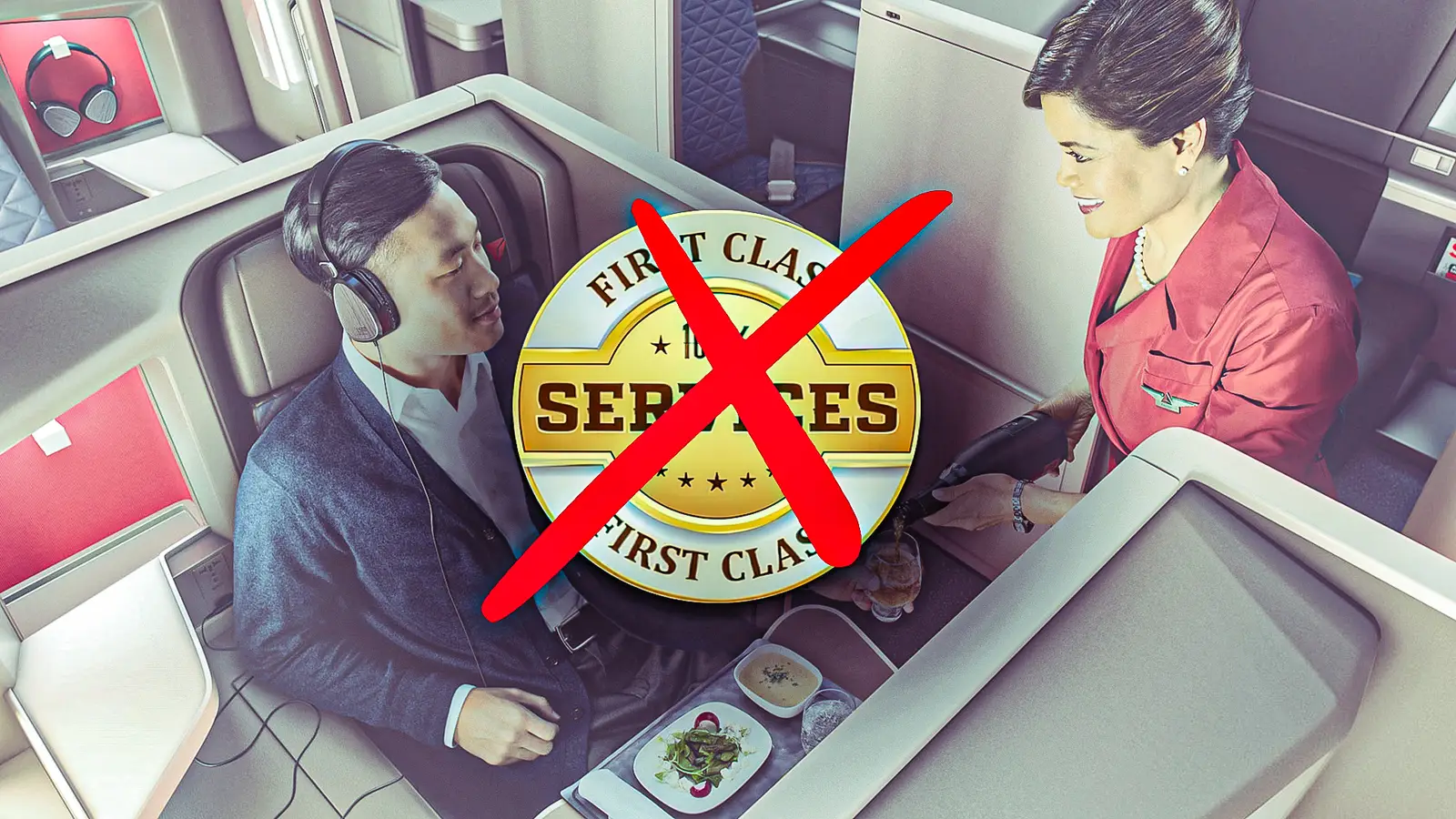
First class travel is the epitome of luxury, renowned for providing discerning passengers with the most exclusive experience available in the world of commercial aviation. The only more luxurious option is a private jet, but that is still very much reserved for the mega-rich and VIPs.
However, many airlines have chosen to remove their first class product altogether over recent years. In this article, we will take a look at what has led them to do so and the impact on the broader aviation industry. We will also examine the few airlines still offering a first class cabin onboard their aircraft.
First Class Is Not Very Profitable
Firstly, one of the primary reasons why airlines have ditched their first class cabins is that, generally speaking, they are simply not that profitable. Despite the hefty price tag, few people are paying full price for first class tickets, with many using loyalty points to upgrade from business class to first class rather than paying in cash. This raises the question: how much money are airlines actually making from their first class offerings?
First class cabins take up a lot of floor space, which is highly valuable on an aircraft, with a typical first class suite requiring the same amount of space as around six economy class seats. The hard product of a first class suite is also extremely expensive, often costing hundreds of thousands of dollars to build, install, and maintain. The additional costs of the luxurious, high-quality amenities, dining, lounges, and dedicated staff that first class passengers have come to expect also quickly add up.
By contrast, airlines often make the bulk of their revenue from their business class and premium economy cabins. Business class tickets bring in a high sales price without taking up as much floor space as their first class equivalents, while premium economy cabins are much cheaper to operate than business class services. They also only occupy slightly more room than an economy class seat, but with a significant price increase (often double or even triple the standard economy class fare).
Superior Business Class Products
In recent years, airlines have really upped their game when it comes to business class. It is now commonplace to find private suites in business class cabins, previously the reserve of only the most luxurious first class products. Let’s take Qatar Airways’ award-winning Qsuite as an example, which was first introduced in 2017 and has recently undergone a major upgrade program, setting new standards for comfort and privacy in long-haul air travel.
Each Qatar Airways Qsuite is a fully enclosed pod with a sliding door, giving passengers significant privacy. The layout is 1‑2‑1 across the cabin, so every passenger has direct aisle access, and in many rows, the center seats can be configured to become a “quad suite.” Meanwhile, for couples, the middle pair of suites can be transformed into something that resembles a double bed, allowing for extra comfort and privacy on long flights.
With such superior business class products now on offer, the gap between business class and first class has been blurred to the extent that many passengers may wonder if it is really worth paying the often significant extra cost for a first class ticket that offers little above a business class ticket.
Greater Use Of Narrowbody Aircraft
Large aircraft such as the Boeing 747 used to be the aircraft of choice for longer, heavier routes. These widebody aircraft had significant space to accommodate a first class cabin. However, recent trends have seen long-haul aircraft getting smaller (think the Airbus A350 or Boeing 787), with a growing number of routes now even operated by narrowbody aircraft such as the Airbus A321XLR.
These smaller aircraft have less floor space available than their larger counterparts to accommodate a meaningful first class cabin. Airlines have, however, been innovative with the design of their Airbus A321XLR cabins, ensuring that business class products are similar to or better than those found on their widebody aircraft.
Thai Airways Drops First Class
Thai Airways is among the carriers to most recently announce an end to its first class product. The carrier’s first class offering had already been significantly scaled back compared to its former glory, being available only on three Boeing 777-300ER aircraft that operate just two routes from the airline’s hub at Bangkok Suvarnabhumi International Airport (BKK) to London Heathrow Airport (LHR) and Tokyo Narita Airport (NRT).
It is easy to see why Thai Airways has chosen to remove its first class offering altogether. Offering a first class product on such a small sub-fleet of aircraft does not make financial sense for any airline looking to make a profit. The Boeing 787-9 will form the backbone of Thai Airways’ fleet in the years to come. The latest data from ch-aviation shows that the carrier already operates three and has a further 45 on order, with deliveries due to resume in 2027. The aircraft will feature a ‘business class plus’ product in the front row, and this configuration will also be rolled out across the airline’s 777-300ER fleet.
Riyadh Air Opts For No First Class
Despite first class still being an option at rival Emirates, upcoming start-up airline Riyadh Air has made the decision not to offer a first class product when it takes to the skies for its first commercial services later this year. In an interview with Airport Industry Review, the carrier’s CEO, Tony Douglas, said,
“It’s clear that many airlines are focusing on their business class product and moving away from a dedicated first class product. At Riyadh Air, we feel that first class is not an efficient use of the real estate on the aircraft and that could be put to better use with a three-cabin product that includes business class, premium economy, and economy. By having an incredible business class product with this laser focus on passengers across all touchpoints, it will ensure our guests feel valued – regardless of their cabin of travel.”
Riyadh Air is a new airline launched by Saudi Arabia in March 2023. Owned by the Public Investment Fund, it is part of the country’s Vision 2030 plan to boost tourism, reduce reliance on oil, and turn Riyadh into a major global travel hub. The airline will be based at Riyadh’s King Khalid International Airport (RUH).
Riyadh Air has already placed large aircraft orders, including 39 Boeing 787-9s for long-haul flights and 60 Airbus A321neos for regional routes. The carrier aims to serve over 100 destinations by 2030 and is expected to add around $20 billion to Saudi Arabia’s non-oil economy and create thousands of jobs. Although it has yet to commence commercial services (these are planned for later in 2025), Riyadh Air is currently building partnerships with major worldwide carriers such as Delta Air Lines, Singapore Airlines, and Air China. These partnerships will help the airline expand its global reach through shared routes and networks.
Airlines That Still Offer First Class
Despite first class seemingly becoming a thing of the past, there are still a few airlines around the world that continue to offer a first class product. One of the best in the industry belongs to Singapore Airlines. The carrier’s first class product offers one of the most luxurious experiences in commercial aviation. Passengers enjoy spacious suites with sliding doors, a full-flat bed, fine dining crafted by world-renowned chefs, and top-tier service from the airline’s award-winning crew. Select Airbus A380 aircraft also feature “Singapore Suites,” private cabins with leather armchairs and separate beds, some of which can be combined for couples.
Emirates is another major global airline that still offers a first class product. On the carrier’s Boeing 777-300ERs, passengers can enjoy fully enclosed suites with floor-to-ceiling sliding doors, mood lighting, and personal climate control. Each suite features a wide leather seat that transforms into a fully flat bed, a large entertainment screen, and gourmet dining served on demand. Meanwhile, on the airline’s Airbus A380s, first class passengers can enjoy the unique experience of taking a shower onboard in the exclusive shower spa or relaxing in the onboard lounge bar. Emirates combines luxury, personalized service, and cutting-edge technology to create a first-class experience that rivals private jet travel on flights to and from its hub at Dubai International Airport (DXB).
Meanwhile, British Airways is one of the few European carriers to still offer a first class product. The oneworld member deploys its first class-equipped aircraft on high-profile routes and those that bring in a lot of revenue, such as London Heathrow Airport (LHR) to New York John F. Kennedy International Airport (JFK).
From an avgeek perspective, it is great to see luxurious first class products still on offer from a number of airlines around the world. However, most of us can only dream of enjoying such an experience. With such products out of reach for the majority of passengers, one has to question the place of first class in modern-day aviation, and ask if such services are more about prestige over profit.



